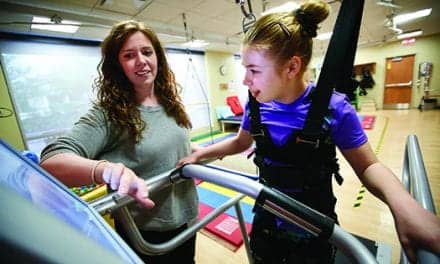RxFunction, creator of Walkasins, has expanded its walk2Wellness study to include researchers at Hebrew SeniorLife, with enrollment of its first participant completed recently. According to the Eden Prairie, Minn-based company, Walkasins is an external lower limb sensory prosthesis designed to replace the nerve function used for detection and signaling of foot pressure sensation. It was developed to help improve balance in patients who experience gait and mobility problems due to sensory peripheral neuropathy. The Hinda and Arthur Marcus Institute at Hebrew SeniorLife, a Harvard Medical School affiliate, is the fourth study site of RxFunction’s walk2Wellness long-term clinical trial, designed to assess the effectiveness of using Walkasins Lower Limb Sensory Neuroprosthesis with peripheral neuropathy patients who have a high risk of falling. This study will build upon the company’s previous research trial with veterans that suggested that short-term use of Walkasins immediately improved balance function and gait speed associated with lowered fall-risk among a majority of patients. The other three study sites are Minneapolis VA Health Care System, Minneapolis; M Health Fairview, Saint Paul, Minn; and Baylor College of Medicine, Houston. Lewis A. Lipsitz, MD, Director, Marcus Institute, Chief Academic Officer, Hebrew SeniorLife, and Professor of Medicine, Harvard Medical School, and Brad Manor, PhD, Associate Scientist, Marcus Institute, and Assistant Professor of Medicine, Harvard Medical School, are leading the study at the Marcus Institute, per a company news release. “I am delighted that Drs. Lew Lipsitz and Brad Manor at the Marcus Institute will head up the fourth site in our walk2Wellness study,” says Lars Oddsson, PhD, CTO-Co-Founder of RxFunction, in the release. “I have known Dr Lipsitz and followed his work since my tenure at Boston University. He is a world-renowned key opinion leader who has led a number of ground-breaking studies in this field, including the NIH-funded MOBILIZE Boston Study (Maintenance of Balance, Independent Living, Intellect and Zest in the Elderly of Boston).” “In addition to the long-term effects of Walkasins use on clinical outcomes that we study in the walk2Wellness trial, Marcus Institute will also conduct a pilot study on a subset of participants using structural and functional magnetic resonance imaging of the brain before and after a six-month period of daily Walkasins use,” he adds. “This may help us better understand mechanisms of action and is very exciting.” [Source: RxFunction]
Walkasins Maker RxFunction Expands walk2Wellness Study






So happy to read about this study. I have polyneuropathy and although I am very healthy, I need a walker or cane to walk. I exercise 2 hours a day with the bike, treadmill and certainty full body massager plus balance on a balance board plus balls, etc. How can I get on your clinical trials?
Louise Vezina. E-mail [email protected]. Phone: 703-266-7590